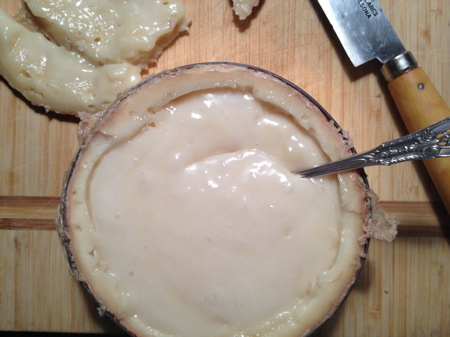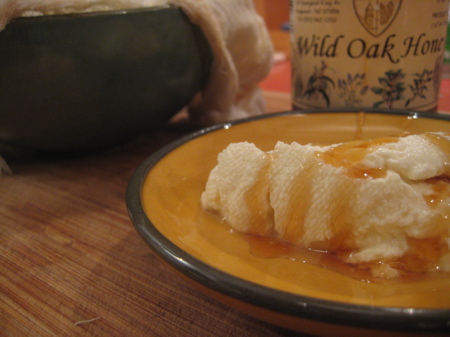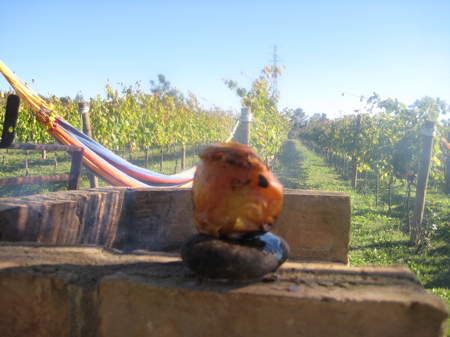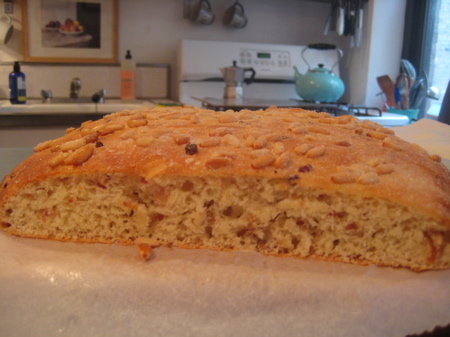teresa's blog
December 19, 2013
I don't know how it escaped our greedy knives, but there it was at the end of our Extremadura trip last spring: a Torta del Casar. Intact. I packed it into my suitcase and hoped the cold of the airplane baggage compartment would put its sweet stink on hold without killing it.
It was Paul Richardson, the author of A Late Dinner, who put me onto the tortas of the region. They're not cakes, as the name implies, but creamy raw sheep's milk cheeses made from the milk of Merino and Entrefina sheep (known for high quality and scant production).

"Tomatoes are really fruits, you know," said Viçens, whacking them up and tossing them into a bowl full of strawberries. "You'll see, they go beautifully together, especially when your tomatoes are a little tart."
People around the Empordà differ on the subject of who makes the best recuit—the wheyful cheese of Catalonia that's so perfect on a little toast with tomato jam. Or drizzled with honey for dessert.
It has always seemed to me that cooking over a wood fire requires a certain restlessness. Cookouts with my Catalan friend Jaume prove this is true even on Mediterranean shores. The mood around his fire might be mellowed by fall sunshine and hits of wine from a porrón, but still, there are mushrooms to move from one side of the grill to the other, arguments to be fanned regarding the best way to grill a coca (pizza's Catalan cousin), and embers to be jabbed.
I hear that in France people settle for just one day to celebrate fat: Mardi Gras, that happy Tuesday before Lent and all its pious negation begin.
In Catalonia, the fat-eating starts almost a week ahead of time, on Fat Thursday. First thing in the morning on Dijous Gras, they reach for a slice of coca de greixons to get the ball rolling.
"Ooh-la-la," say the French, when you tell them the other name for this barely sweet, mysteriously savory breakfast flatbread,coca de llardons. Yes, those little bits in the dough are, well, they are not exactly lard. They're bacon.
 Suquet, everyone will tell you, is Catalonia's bouillabaisse––a thrifty fishermen's stew made from the less promising creatures amid the day's catch. Next thing you know, they're serving you a rich bowlful of the stuff, scented with brandy and saffron and topped up with luxury goods like langoustines.
Who wouldn't put it past those Catalan fishermen to take a little extra time at sea to flambé their lunches?
Suquet, everyone will tell you, is Catalonia's bouillabaisse––a thrifty fishermen's stew made from the less promising creatures amid the day's catch. Next thing you know, they're serving you a rich bowlful of the stuff, scented with brandy and saffron and topped up with luxury goods like langoustines.
Who wouldn't put it past those Catalan fishermen to take a little extra time at sea to flambé their lunches? "La Crisis" cut so deep this year in Spain that my friends will first have to gather their lottery winnings before they can mail my year-end turrón supply. That said, I am not terribly worried about suffering a turrón-free 2011 because the chances of my nougat suppliers winning at least a little something in the Sorteo Extraordinario de Navidad, to be drawn in Madrid tomorrow, is around 15 percent. In lottery terms, if you buy a billete it's a cakewalk to win a piece of El Gordo, the big one: 0.0012 percent (one in 83,333).
Virtually everyone in Spain plays the Christmas lottery. It's the biggest in the world in terms of total prize payout (a couple of billion Euros) and surely the most democratic.
"La Crisis" cut so deep this year in Spain that my friends will first have to gather their lottery winnings before they can mail my year-end turrón supply. That said, I am not terribly worried about suffering a turrón-free 2011 because the chances of my nougat suppliers winning at least a little something in the Sorteo Extraordinario de Navidad, to be drawn in Madrid tomorrow, is around 15 percent. In lottery terms, if you buy a billete it's a cakewalk to win a piece of El Gordo, the big one: 0.0012 percent (one in 83,333).
Virtually everyone in Spain plays the Christmas lottery. It's the biggest in the world in terms of total prize payout (a couple of billion Euros) and surely the most democratic. Els Castells ja són Patrimoni Cultural i Immaterial de la Humanitat. This is by no means immaterial: UNESCO has declared Catalonia's castells part of the "Intangible Cultural Heritage of Humanity."
Castells are not just a bunch of Catalans standing on one another's shoulders in what UNESCO boringly translates as "Human Towers." They're collective, athletic performance art. They take years of practice and minutes to build.
And while UNESCO says they are a way to fend off the culture-eroding power of globalization, they are essentially done for kicks. What got them on humanity's heritage list, among other things, is that they are traditional, passed down through generations, yet "living"; they're part of a particular cultural identity, yet inclusive.
 Back in New York this week, but comforted by quinces at the Union Square Greenmarket.
I felt a little sorry for them, bitter, lumpy things, and took some home with me. Well, they rolled out of that bag in a cloud of their own perfume, asking who was feeling sorry for whom. They smelled like lemon. Or over-ripe pear. Wrigley's Juicy Fruit in the flesh. My plan had been to cook them down into codonyat, the Catalan quince gelée that is so perfect with cheese. But now all I wanted was to have them near me. Sniff them. Run my hands over their fuzzy backs.
Back in New York this week, but comforted by quinces at the Union Square Greenmarket.
I felt a little sorry for them, bitter, lumpy things, and took some home with me. Well, they rolled out of that bag in a cloud of their own perfume, asking who was feeling sorry for whom. They smelled like lemon. Or over-ripe pear. Wrigley's Juicy Fruit in the flesh. My plan had been to cook them down into codonyat, the Catalan quince gelée that is so perfect with cheese. But now all I wanted was to have them near me. Sniff them. Run my hands over their fuzzy backs.



